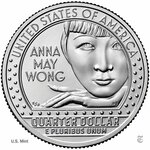

On January 16, 1932, American actress Anna May Wong published an article titled “Manchuria” for Script magazine about Japan’s invasion of a region then controlled by China – an event that led to the continued escalation of tensions between the two countries.
Wong – America’s first Chinese-American movie star – wrote with fervor arguing for an end to Japan’s military incursions near Peking and Shanghai.
“Japan’s iron heel will impale upon Manchuria the penetrating steel of a mechanical civilization,” she wrote. “The simple democratic spirit of the Chinese agrarian will be suppressed…”
A month later, “Shanghai Express,” the defining movie of Wong’s career, premiered in the U.S. The film, which will be shown April 25 at Woodmere Art Museum, elevated Wong to stardom. But the Chinese Nationalist Party’s Kuomintang government was not impressed by the actress’ notoriety or support. In fact, the government targeted Wong, blaming her for violence that later erupted in Shanghai.
In the movie, directed by Josef von Sternberg, Wong plays Hui Fei, a high-class Chinese prostitute and the traveling companion of Marlene Dietrich’s Shanghai Lily, the notorious “White Flower of China.” Shanghai Lily is less a prostitute than a porn star, who faces occasional contempt.
Hui Fei is wearing subdued clothing, designed by Edith Head, and arrives at the station in a beautiful Art Deco palanquin – much more elegantly than Dietrich. She is a prostitute, a patriot, despised by all, and horribly mistreated. In the end, she seeks only justice. She wants neither false praise nor pity.
Hui Fei is literally treated worse than a dog in the movie, just as Anna May Wong would soon be treated by the Nationalist government. In her quiet, graceful way, she throws back the contempt she faces with a flick of cigarette ash or a few insulting words.
Her only crime is being a prostitute, which was almost an archetypal role in Chinese movies of the time. Her behavior towards others on the train is beyond reproach. Only when she is savagely attacked by Warner Oland, the outlaw warlord whose forces hijack the train, does Hui Fei sink into despair – and then is saved and comforted by Dietrich in a scene charged with danger and eroticism.
When Hue Fei’s bravery arguably saves the passengers on the train, she wants no publicity. Rejecting the thanks offered by Shanghai Lily, Hue Fei responds, “It is of no consequence. I didn’t do it for you.” [But for me]. The scene crackles with the intensity of a scene from a dramatic movie today. Not one that is 91 years old.
Hue Fei is an authentic anti-hero, perhaps the first true female anti-hero in a sound Hollywood movie – almost as much as Clint Eastwood’s “Man With No Name.”
On January 28, 1932, 12 days after Wong’s Script magazine article appeared, a sect of pugnacious Japanese Buddhist monks provoked a fight with Chinese citizens in Shanghai. Several people soon died in the bloody melee, and Japanese military forces intervened with a punitive raid. Local Chinese police reacted; the Japanese then attacked with dive bombers and marines, and Shanghai became the place of the first concerted air attack upon a civilian population.
After its premiere, “Shanghai Express,” retitled “Not Afraid to Die,” was quickly shipped for presentation in the safe French Concession, an area of Shanghai then administered by the French government. But a radical professor and head of the theater department of a local university brought a troupe of his students to stage a riot at the movie theater premiering the movie. The film was not publicly screened in China for many years.
The Kuomintang government took no real military action against the Japanese. But one of China’s former warlord armies saw the destruction of Shanghai and mutinied to attack the Japanese.
The central government did not provide support, and the notorious “Green Gang,” provided all its own material, money and intelligence.
Instead, the central government began a concerted effort to diplomatically complain about “Shanghai Express,” and Paramount, which released it.
Wong became the focal point of their complaints. According to them, it was she, not the government in Nanking that was to blame. She “brought” shame to China…again.”
“Shanghai Express,” will be screened at 7:30 p.m. April 25. Doors open at 7 p.m. The Woodmere is at 9201 Germantown Ave. This screening is being presented in loving memory of the late David Mallery (1924- 2010), the heart and soul of Chestnut Hill Film Group for decades, who loved Sternberg-Dietrich movies.